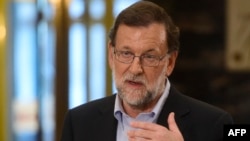The leader of Spain's Socialist party on Friday rejected pressure to help break an eight-month political deadlock by supporting their conservative rivals and
told acting Prime Minister Mariano Rajoy to find help elsewhere.
Spain is the closest it has been since two inconclusive elections in December and June to filling a vacuum after Rajoy said this week he was now ready to face a parliamentary confidence vote for a second term in office.
But he faces major obstacles, including a steadfast refusal by the Socialists to support his candidacy in a highly fragmented parliament.
Rajoy's center-right People's Party (PP) still lacks the majority it needs to win the confidence vote even as it closes in on a deal to get support from centrists Ciudadanos ("Citizens"), Spain's fourth-biggest party.
But Socialist leader Pedro Sanchez on Friday repeated he would not come to the rescue and in turn tried to heap pressure on Rajoy to find support elsewhere for a stable government.
"I'm warning you that the Socialists will not only vote against [Rajoy] in the investiture vote but also, to be consistent, if he is invested as the next prime minister we will vote against his budget, which I'm sure will include more
spending cuts," Sanchez told reporters on the island of Ibiza.
"What Rajoy needs to do is to keep talking to potential
allies, and we are not among them," Sanchez said.
Even with Ciudadanos' support, Rajoy remains seven seats shy of an absolute majority, thrusting the ball into the second-placed Socialists' court. Their abstention in a confidence vote would be enough to enable a PP-led minority
government.
Sanchez, who oversaw the Socialists' worst result in the June ballot, faces a tough choice between allying with a long-time foe or being blamed for triggering a third election, most likely on Christmas day.
The Socialist party lost power to Rajoy in 2011 at the height of Spain's financial crisis and its support has been eroded by the rise of anti-austerity Podemos ("We Can"), which hopes to succeed as the dominant left-wing force.
Regional support
A cluster of small regional parties which in the past have swayed either side of Spain's political spectrum are wildcards which could potentially still help Rajoy clinch a majority.
These include a nationalist party in the Basque Country, but regional elections there on Sept. 25 are likely to complicate his attempts to get them on board in time.
Rajoy has support from a single delegate from the Canary Islands, but a deepening stand-off with one-time allies in Catalonia over a secessionist challenge there means that is likely a dead-end.
Even members of Rajoy's party admit that getting the support of these parties looks unfeasible.
If Rajoy fails in his bid to become prime minister in two weeks' time, it would trigger a two-month window to try and form a government, during which he could try and face another confidence vote.
If a government is not formed in that time, a new election would automatically be called.






